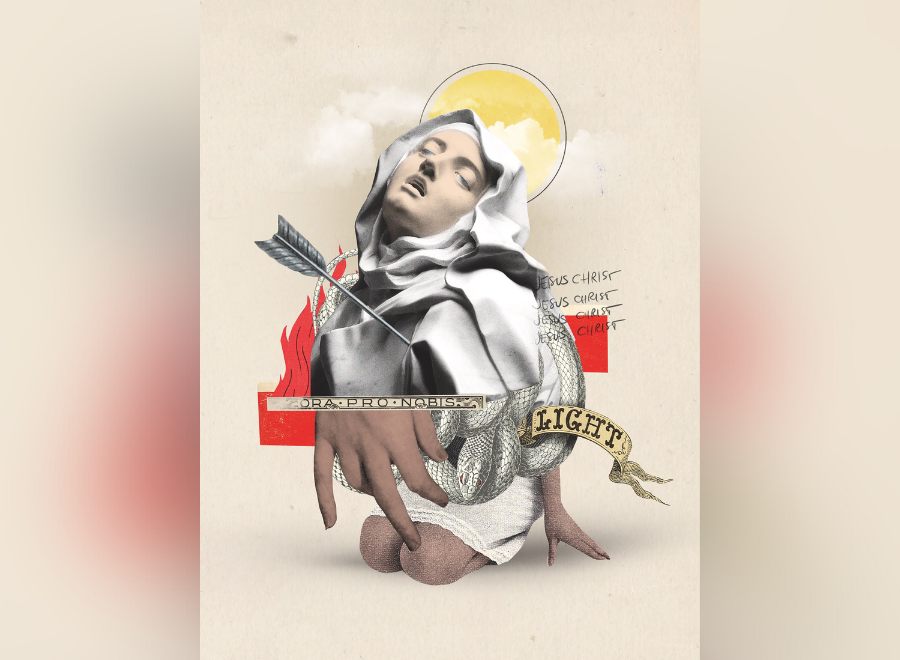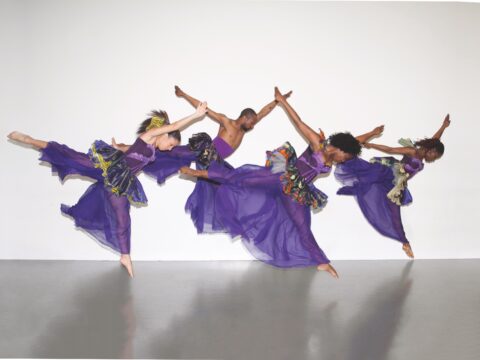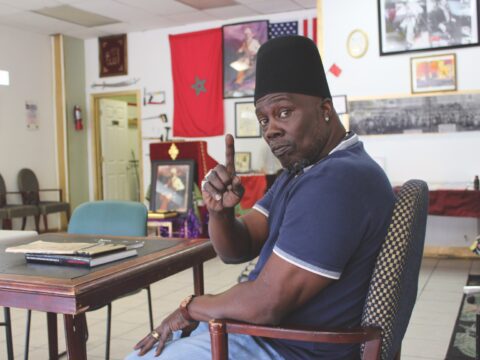Dear St. Teresa of Ávila,
It is thanks to Gian Lorenzo Bernini that I fell in love with you. The most prominent sculptor of his time, he perfected the baroque aesthetic. And it is through one of his works, L’Estasi di Santa Teresa, that I met you.
You are a swooning form in white marble, the magic of a master who has rendered stone near fluid, folding, draping, floating around you. With the subtle curve of your toes and fingers and your face splayed open in bliss, I can almost hear your moan. If I look only from the corner of my eye, I swear I can see you writhing, surrendering wholeheartedly to the arrow on its way to pierce you, to the seraph alight before you.
I wanted to be where you were in Bernini’s depiction: trusting completely, giving yourself over to be consumed by God’s holy fire. “The pain was so great, that it made me moan; and yet so surpassing was the sweetness of this excessive pain, that I could not wish to be rid of it,” you wrote in the 1500s. With your acceptance of and ability to find hope and meaning in physical suffering, it is fitting that you are the patron saint of the sick.
Critics say that Bernini eroticized your vision, but this is why I adore you. Despite, or perhaps because of, your asceticism, your descriptions of spiritual life are lush with longing, with sensuality.
My affections for you are complicated. In reading your work and learning about your life, I have been torn and challenged, enraged and confused, moved. When I was a child, and for a while after, I was consumed with fear of burning in hellfire for eternity. The idea of Christ’s sacrifice confused me. If the Messiah, the Lamb of God, paid the price for my sins, was I not then free to simply live? And why would God — all loving and all knowing — set me up for failure by shaping me with a body and mind predisposed to sin?
More on Broadview:
- How I learned to embrace St. Anne like my high-waisted mom jeans
- What ‘Paradise Lost’ teaches us about life in isolation
- There’s still room in my heart for St. Francis, even centuries after his death
Self-loathing seemed a prerequisite for holiness, and I took it very seriously. In fits of what I now recognize as obsessive-compulsive impulses, I would write “Jesus Christ” over and over in my notebooks, on dust-covered surfaces, wherever I could, for fear of being abandoned by God and dragged to hell by the devil if I didn’t. I learned that there was a war for my soul, and I feared that God might realize that mine was measly and not worth all the effort.
In The Interior Castle, my favourite of your writings, you seemed to understand my fears, St. Teresa. You refer to us humans as “loathsome worms.” I laughed when I read this because I get the self-hatred; I’ve guzzled it by the gallon. I’m not sure what pop culture looked like in your time, but Catholic shame has become a sort of joke, warranting wry laughter and nods of understanding. I want to know: did you truly believe that we are rotten creatures wired for corruption, who must ceaselessly strive to please God?
Listen, it’s a compelling story. The world sometimes seems generally horrifying. There is a poem, a short meditation, called Good Bones by Maggie Smith that moves me to tears every time I read it because it rings so true:
Any decent realtor,
walking you through a real shithole, chirps on
about good bones: This place could be beautiful,
right? You could make this place beautiful.
I don’t know how the world got to be this way, Teresa. I have some ideas about power and corruption, the patriarchy, capitalism, misogyny, enslavement, dehumanization — so much of which the church is embedded within. Do you believe that sin and evil are the same as cruelty and unkindness in a larger historical context? I think that demons are not so different from systems of oppression and from greedy exploitation of the Earth and everyone on it.
I adore the passion in your writing. Though I’ve only read the English translation, your architecture of language is stunning. Yet, even within these stories, you erase yourself, call yourself stupid, regurgitate the false and sexist notions of women having weak minds and constitutions. You wrote: “Sisters, take care to lay a firm foundation by seeking to be the least of all and the slave of others, watching how you can please and help them, for it will benefit you more than them. Built on such strong rocks, your castle can never go to ruin.”
May I be so bold as to say that this is nonsense? I suppose this is a good time to tell you that I am a feminist or womanist — a person concerned with and invested in justice and liberation of oppressed people. I suppose you believe oppression in all its forms is merely a symptom of a fallen world, that suffering is our lot owed only to our sinful nature.
Because I dig a good scam, I wonder: were you being subversive? Sometimes I imagine all your self-effacement is accompanied with a knowing wink because you understood that this was the only way for your work to be accepted.
I have to say that if you are not intentionally subversive, then I disagree with you. Blasphemous as it may seem, I don’t believe that God desires us to suffer. If I believe that my soul is of God, that this loving Creator shaped me in their image, then I have to accept that there is something inherently good, inherently holy in me.
I cannot explain why the world can be pretty awful; perhaps it’s just a matter of perspective. I know, however, that this profound longing for better, this unshakable belief that better is possible, is not unique to me or people like me. I didn’t mention it before, but I am Black, from West Africa, and like you, I am a woman.
I love your idea of the soul being an interior castle made of many mansions, all of which lead us closer to God. Still, if I may, I would like to propose that it is a place of rest and respite, a place of sanctuary and intimacy with a most loving, most divine self, with a God who isn’t petty, vengeful or interested in our toiling to death. I believe those are our human inventions, old stories that we could perhaps do away with now.
Sincerely,
francesca
***
francesca ekwuyasi is a writer and artist from Lagos, Nigeria. Her debut novel, Butter Honey Pig Bread, was longlisted for the 2020 Giller Prize and a finalist for CBC’s 2021 Canada Reads. She lives in Halifax.
















“…Human inventions, old stories that perhaps we could do away with now.” Yup. But it takes education and introspection and a willingness to step away from the crowd.